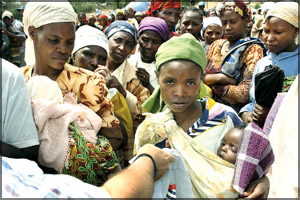Preserving protection in a world on the move
Antonio GUTERRES
After a half-decade decline in overall refugee numbers, global forced
displacement is again on the rise. For the second straight year, the
numbers of refugees and conflict-generated internally displaced people
grew to a total of 37.4 million in 2007 - some 11.4 million refugees
outside their homelands and 26 million people forcibly displaced within
their own countries. And there are ominous signs that we are likely to
see even more people forced to flee in the future.
The warning signs are evident on the Kenya-Somalia border, where
nearly 200,000 Somalis have sought refuge in the sprawling Dadaab
Refugee Camp complex after fleeing the seemingly endless civil strife in
their shattered homeland. And they continue to come - 20,000 since
January alone.
|

Refugees in Africa |
Others have risked their lives to reach Ethiopia, Djibouti, Yemen and
beyond, many saying they see no future at home.
In the last three months alone, violence in Mogadishu has forced
50,000 more Somalis to flee, bringing the total who have fled the
devastated capital since February 2007 to a staggering 850,000. Inside
Somalia, more than one million people are now internally displaced,
often beyond the reach of aid agencies.
Unfortunately, Somalia is but one of several epicentres of human
displacement, which in today’s world - with population flows propelled
by a multiplicity of inter-related factors - is a far more complex
phenomenon than it was in 1951 when UNHCR was founded.
New patterns
Today, many of the barriers to human mobility have fallen and new
patterns of movement have emerged, including forms of forced
displacement that were not envisaged by the 1951 U.N. Refugee
Convention.
Conflict today may be motivated by politics, but at a deeper level,
it can also be about economic mismanagement, bad governance and a host
of other factors, including climate-induced environmental degradation
leading to competition for water and other resources.
The current downturn in the world economy and structural changes in
global markets are having a huge impact on rising food and fuel prices.
These in turn have an immediate and dramatic effect on the poor,
including refugees and the displaced. Extreme price increases are
generating instability and conflict in many places, with the potential
of triggering more displacement. Extreme poverty is itself a trigger of
conflict.
Prevention
Neat classifications of who is a refugee deserving protection and who
is not are becoming increasingly blurred. This makes it all the more
urgent that the international community finds ways to address the
increasingly complex root causes of displacement in a coordinated and
comprehensive manner.
The best solution is prevention. We need to better understand the
triggers of displacement, including the nature of failed and failing
states such as Somalia that are unable or unwilling to provide citizens
with physical, material or legal security.
Policy frameworks must be found to ensure that the international
community deploys all the tools at its disposal - aid, trade, diplomacy,
security and relief - to help guide countries from failure toward
sustainable stability.
This could go a long way toward ensuring that people would not have
to flee in the first place, or at least that refugees could soon go home
to begin rebuilding when circumstances permit.
Meanwhile, ensuring access to an effective asylum process and the
fair treatment of asylum seekers and refugees remain crucial. But it is
becoming increasingly difficult in many countries, including those whose
efforts to control illegal migration are failing to make a proper
distinction between people who choose to move and those who are forced
to flee.
All too often, refugees seeking safety are being turned away at
borders in direct contravention of the 1951 Refugee Convention. While
governments have a right to control their borders, such controls should
be sensitive to protection concerns and the rights of refugees.
Refugees show incredible courage and perseverance in overcoming
enormous odds to rebuild their lives. Ensuring that they get the
protection they deserve helps all of us because refugee rights are human
rights - rights that belong to everyone.
(The writer is the UN High Commissioner for Refugees) |

